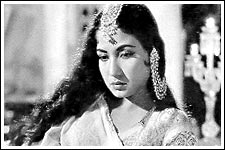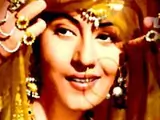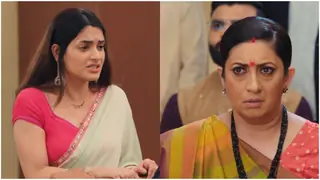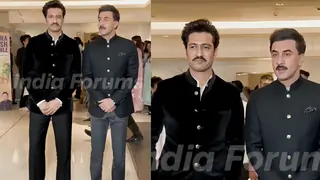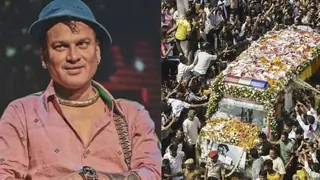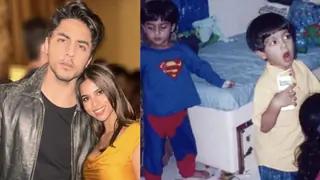CLICK HERE TO WATCH THE MOVIE NOW
| |
Meena Kumari lived through an era that brought forward the advancement of the Indian cinema from the Golden era to modern times in a magical career that would become the envy of today's film artists. An era that meticuously painted a canvas larger than life yet subtly, as real as life itself. A time when film artists portrayed characters true to the struggles and triumphs of the common man. By the time Meena Kumari graced the silver screen, India had already advanced in technology from silent films to talkies. This technical advancement would lend to the cinema the sound of a tremulous voice belonging to an actress who would eventually give rise to a certain culture of cinema like none other before or after her. Meena Kumari was simply unique. Born in Bombay as Mahjabeen Bano to theater actor Ali Box and dancer Iqbal begum on August 1st, 1933, Meena Kumari's Artistic rise to prominence would become an inspiration for years to come. Yet personally, this very prominence would become her life long struggle in a race for survival amidst a distinct backdrop of wine, relationships and stardom. Her journey through films would begin while living next to the Rooptara studios and her father was determined to have her in films and become the breadwinner for her family's immediate survival. In 1939, at age 6, Meena begun essaying roles and characters that would paint a canvas that looked like none other. Her first film, Leatherface, was made at Prakash studios and directed by Vijay Bhatt. She would journey onto a trail of mythologicals such as Shri Ganesh Mahima and the fantasy tale of Alice and the Wonder Lamp. More than a decade had passed and Meena Kumari had been constantly in search for a role, a character, that would challenge her sensibilities and stimulate her artistic abilities. This would come to her in the form of the film Baiju Bawra. Released on the 5th of October, 1952, Baiju Bawra brought forward the spirit of Gauri, a woman whose purpose serves her lover's achievements regardless of her sufferings. Meena Kumari would excell in her performance as Gauri and Baiju Bawra would become one of India's biggest films, celebrating Diamond Julilee status. On her part, Meena Kumari became India's most celebrated leading lady and won the Filmfare Award for her stunning performance as Gauri. On Sunday, March 21st, 1954, as the first ever Filmfare Awards were held at the Metro, some 1000 film personalities and dignataries came to attendance. In the moments leading to the Awards ceremony, fans took their place in history by packing the streets and roadsides leading to the Metro that night. A mere glimpse of the screen goddess could easily cherish a life time of memories. In a proud moment of glory, India's leading lady of celluoid rose to thunderous applause and ovation when accepting the first ever Filmfare Award in the category of Best Actress in a film. At this historical juncture of her career, her tremulous voice remained true to her emotions in accepting the award. A nation had showered her with love and appreciation and returned their devotion to her. Many years have come and gone and many others have graced the stage in acceptance of the award but yet to captured the spirit of triumph and victory as Meena Kumari did that night. With her that night was Kamal Amrohi. Amrohi had become a member of an elite group of India's brilliant craftsmen. During the nineteen forties he had brought forth one of the earliest of psychodramas screened for the Indian nation in the form of the now classic film Mahal, released in 1949. Armed with the confidence of a director and the success of his very first film, Amrohi would cast Meena Kumari in his next directorial venture, Daera and she would marry him. Together they would conceptualize and launch one of India's best known contemporary costume drama and named it Pakeezah. Although Meena would gave brilliant performances in lighter romantic roles in films such as Azaad, Miss Mary and Kohinoor, it is in the role of the great tragedienne that she is best remembered. Should the wind fingle her curls, then her lashes would flicker, her eyes would lay still and her lower lip would fold backwards, her nostrils becomes widened, and her voice cuts through the moment, upheld by her very own creation...the embodiedment of a woman. By 1962, Meena Kumari's career had peaked like none other. That year she had swept the Filmfare awards with 3 nominations for her performances in the films Aarti, Sahib Bibi Aur Ghulam and Main Chup Rahoongi and took home the award for her performance in Sahib Bibi Aur Ghulam. Professionally, Meena Kumari was India's great screen goddess. Personally, she craved inner peace, personal satisfaction and fulfillment. True to her desires and bravery, she would embark on rampages that made headlines across India but never for a moment did her fans lost any adoration for her as a talent.
Meena Kumari had sought fulfilment. It is unfortunate that destiny willed it differently for her. She would divorce Amrohi in 1964 but continued working with him on Pakeezah, the film that would eventually epitomized Meena Kumari as India's greatest cinematic tragedienne. Meena Kumari's love - lorn screen image was no less her real life persona. Her journey through films mirrored her journey through life and are legendary. Everything Meena did was huge. Her relationship with Dharmendra spanned two of her finer films Kaajal and Phool Aur Patthar. As the Nineteen Sixties progressed Meena Kumari would continue to thrive on her sensibilities as a love - lorn woman both on screen as well as in real life. She would spend time drinking, in search of satisfaction and writing Urdu poetry under the pen name Naaz. By 1968 Meena Kumari was 35 years old and alcohol abuse had caught up with her. She would continue work on Pakeezah and a few other films but mostly struggled to find a balance between reel and real life. Something that had been alluding her for almost all of her professional life. Pakeezah was premiered in Bombay on the 4th of February, 1972. In attendance that night was the who's who of the film Industry. Meena Kumari sat through the film and was mostly pleased especially since the film had been in production for 15 years. Up on the screen was the essence of a woman that perhaps only she could understand. As the curtains came back down that night and the lights went up, Meena Kumari heard the familiar voice of the legendary composer Khaiyyam saying " Shahkar ban gaya. " ( the film has become priceless ). Words that brought tears to her. Words that remained true. On the last day of March, 1972, one of India's most beloved screen icons breathed her last. Meena Kumari died from cirrhosis of the liver. Musically yours,
- the Music Merchant
Rohit Jagessar Top
In 1962, Meena cornered all the three nominations in Filmfare's Best Actress category
with Aarti, Sahib Biwi Aur Ghulam and Main Chup Rahungi.
She won for Sahib Biwi Aur Ghulam
1953
Baiju Bawra
1954
Parineeta
1962
Sahib Bibi Aur Ghulam
1965
Kaajal
Filmography
1939
Leatherface
Veer Ghatotkach
1940
Ek Hi Bhool
Pooja
1941
Bahen
Kasauti
1942
Garib
1943
Pratigya
1944
Lal Haveli
1946
Bachchon Ka Khel
Duniya Ek Sarai
1947
Piya Ghar Aaja
1948
Bhichhade Balam
1949
Veer Ghatotkach
1950
Anmol Ratan
Hamara Ghar
Magroor
Shri Ganesh Mahima
1951
Alladin and the Wonderful Lamp
Hanuman Pataal Vijay
1951
Alladin and the Wonderful Lamp
Hanuman Pataal Vijay
Lakshmi Narayan
Madhosh
Sanam
1952
Baiju Bawra
Tamasha
1953
Daera
Dana Pani
Do Bhiga Zameen
Foot Path
Naulakha Haar
Parineeta
1954
Baadbaan
Chandini Chowk
Ilzaam
1955
Adl - E - Jahangir
Azad
Bandish
Rukhsana
1956
Bandhan
Ek Hi Raasta
Halaaku
Memsaahib
Naya Andaz
Shatranj
1957
Miss Mary
Sharada
1958
Farishta
Sahara
Savera
Yahudi
1959
Ardhangini
Chand
Char Dil Char Raahein
Chirag Kahan Roshini Kahan
Jagir
Madhu
Satta Bazaar
Sharaarat
1960
Bahana
Dil Apna Aur Preet Parai
1961
Bhabhi Ki Chuudiyaan
Pyar Ka Saagar
Zindagi Aur Khwab
1962
Aarti
Main Chup Rahungi
Sahib Biwi Aur Ghulam
1963
Akeli Mat Jaiyo
Dil Ek Mandir
Kinare Kinare
1964
Benazir
Chitralekha
Ghazal
Main Bhi Ladki Hoon
Saanjh Aur Savera
1965
Bheegi Raat
Kaajal
Phool Aur Patthar
Purnima
1966
Pinjre Ke Panchhi
1967
Bahu Begum
Chandan Ka Palna
Manjhili Didi
Noorjehaan
1968
Abhilasha
Baharon Ki Manzil
1970
Jawaab
Saat Phere
1971
Dushman
Mere Apne
Pakeezah
Saat Sawaal
1972
Gomti Ke Kinare
1979
Meena Kumari Ki Amar Kahani Top
| |







